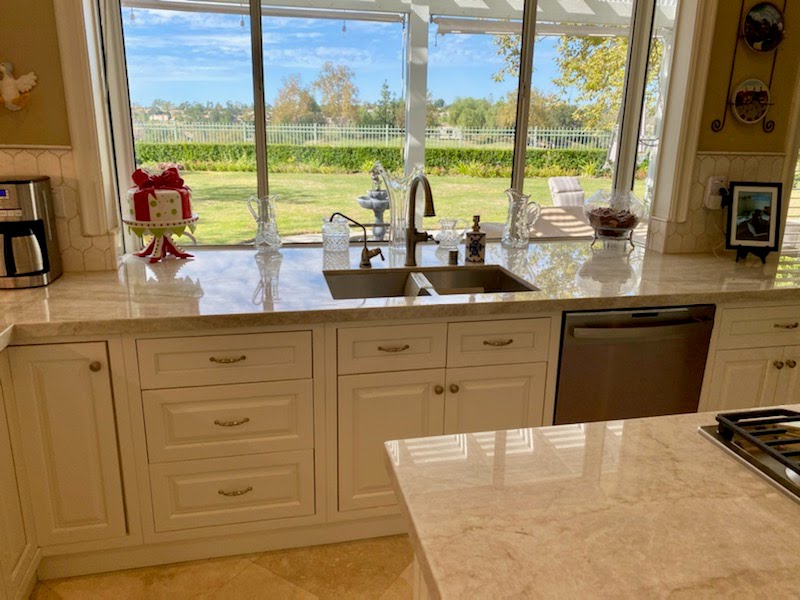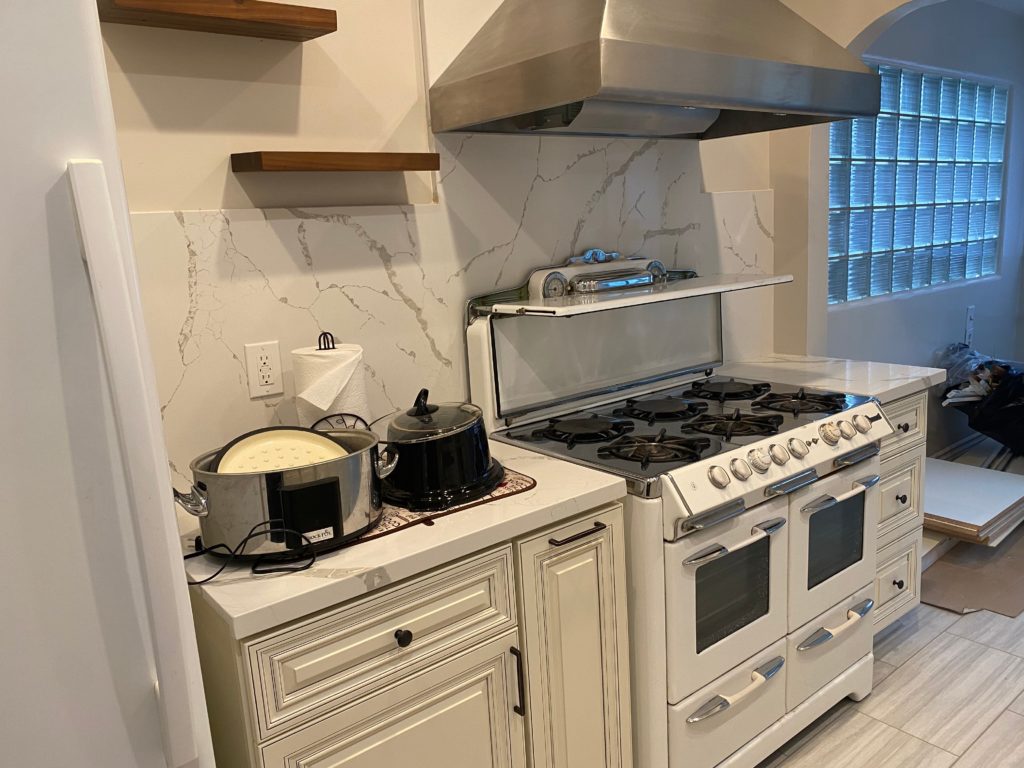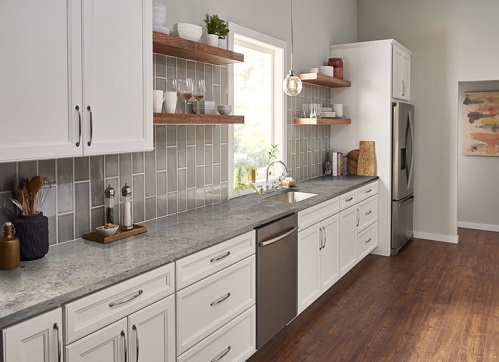Care & Maintenance
Maintenance Question and Tips
1. How to properly maintain my solid wood cabinets?
A soft cotton cloth dampened with warm water is usually sufficient to clean your cabinets. If more thorough cleaning is required, please use a fresh solution of mild hand dishwashing liquid mixed with warm water.
After cleaning, wipe all surfaces with a clean, damp cloth. Dry immediately using another soft, clean cloth.
2. How to properly maintain my marble countertop?
For everyday cleaning, simply use a Ph-balanced natural stone cleaner to care for your stone. Natural stone needs to be sealed after installation. There are many sealers on the market that are made specifically for natural stone as well as companies that specialize in sealing and maintaining natural stone .Regular cleaning and sealing of the grout will help prolong the beauty while keeping the counter clean.
3.How to restore my marble countertop finish?
If a marble finish has become dull, scratched or etched, you can restore the natural shine through the use of a marble polish. Some marble polishes are available in kits. The process can be enhanced with the use of floor buffing machines. The process is generally a re-crystallization process to remove fine scratches and restore the original shine and polish to the stone. This is not an application of a topical sealer or wax to cover-up damaged or worn surfaces.
4. What is the best way to maintain my granite/marble/stone/tile?
For everyday cleaning, simply use a Ph-balanced natural stone cleaner to care for your stone. Natural stone needs to be sealed after installation. There are many sealers on the market that are made specifically for natural stone as well as companies that specialize in sealing and maintaining natural stone .Regular cleaning and sealing of the grout will help prolong the beauty while keeping the counter clean.
5. Do I need to seal my granite countertops?
Yes, granite countertops should be sealed periodically. In a new installation, ask your installer if the countertop has been sealed and what product was used. If it has not been sealed, then use a penetrating sealer made for granite. Sealers, cleaners and other products can be purchased at your nearest location. Sealing granite will provide a barrier that will give you time to clean up a spill before it penetrates into the stone.
6. Will germs collect on my granite?
Granite is like any other surface. If exposed to germs, the germs will sit on the surface until cleaned. There are stone cleaners available that are safe to use in most areas of the home, which will help eliminate germs.
7. Can I use a steam cleaner to clean my tile and grout?
A steam cleaner can be used to clean grout and porcelain or ceramic tile. It should not be used to clean natural stone. Some of the more decorative marbles and granites have soft veins. The force of the water vapor from the steam cleaner might deteriorate the stone.
8. How to properly clean my quartz countertop?
For every day cleaning use a soft sponge or dishcloth with warm water. Thoroughly rinse off the soap/mild detergent with hot water after use and dry with soft cloth or paper towel. To avoid dulling the surface shine, make sure to use a non-abrasive cleaner, and thoroughly rinse off with water after use. Those wishing to use environmentally safe cleaners may also use a combination of 50/50 vinegar & water, rinsing afterwards.
9. How to clean stubborn food stains from my quartz countertop?
Apply a generous amount of a non-abrasive gel, to a damp soft cloth or paper towel (not directly on to the countertop. Wipe the area using a circular motion, rinsing thoroughly with water and dry with soft cloth or paper towel. We recommend a thorough cleaning of your countertop surface on a regular basis.
10. How to clean metal marks and rust from my quartz countertop?
Special use for spot cleaning ONLY – Because of the abrasive nature of this cleaner use Liquid Barkeeper’s Friend only as follows: Place a small amount on a damp coth. Using very light pressure, wipe the area where the marks are in a circular motion, rinsing thoroughly with warm water and dry with soft cloth or paper towel.
Schedule Your Complimentary Consultation
Fill out the form so we can start planning your remodel. One of our friendly coordinators will be in touch to book your consultation.
Our estimates are complimentary and obligation-free.




Visualize Your New Kitchen Countertop
Use our visualizer tool to see what your granite or quartz countertop would look like after completion. Simply choose the countertop material, color, style, and finish, and the tool will simulate the project outcome. Try the visualizer tool now.
11. How to remove dried spills on my quartz countertop?
To remove adhered material such as food, gum or nail polish, first carefully scrape away the excess material with a plastic putty knife and then clean the surface with a damp cloth to remove any marks left behind, and any residual dirt. Also do not use any abrasive pads to clean tougher dirt as abrasive can damage the finish/sheen of your countertops.
12. What chemicals or cleaners should I avoid using on my quartz countertop?
Prolonged exposure to cleaning solutions may cause permanent damage/discoloration to the countertop surface. Avoid exposing your countertops to chemicals such as oven grill cleaners, floor strippers, paint removers/strippers, toilet bowl cleaners, oil soaps, tarnish removers, furniture cleaners, drain products, battery acid, dishwasher detergent, etc. Should your surface accidentally be exposed to any potentially damaging products, rinse immediately with water to neutralize the effect.
13. How does quartz withstand heat?
Quartz is structurally more heat resistant in comparison to other stones, including grantie. However, any stone material can potentially be damaged by sudden and rapid temperature changes, especially near the edges. Therefore, using inexpensive and readily available trivets is always recommended, especially when using cooking units such as electric frying pans, crock pots or toaster ovens. Do not put hot cookware directly on the countertop surface.
14. How durable is quartz?
Tough yes – indestructible? No. Quartz is resistant to cracks, scratches and stains. However, like most materials, excessive force and/or pressure from objects can damage the surface. As with any surface, quartz can be permanently damaged by exposure to strong chemicals and solvents. Use of a minimum 1/8″ pencil round radius on an edge detail profile can reduce the susceptibility for chipping on the edge. A greater radius is recommended for high traffic areas.
15. How often do I need to seal my countertops?
The frequency in which you need to seal your stone surface depends on the area in which the stone is installed. On average, it should be sealed every one to three years. Higher traffic areas may need to be sealed more often. There are several variables that affect this timeframe: The type of stone and its porosity ; The traffic in your business or home; How often you clean your floor; The type of sealer that has been used previously. If you are going to work with a company to have your stone sealed, they may be able to create a recommended schedule for resealing based on these variables.
16. What is the difference between sealing and enhancing?
Sealing adds a barrier to the stone that will give you time to clean up spills that may potentially discolor the stone. Enhancing a stone brings out the natural colors of some stones.
17. Should I seal my grout?
Sealing the grout will add a barrier that will give you time to clean up a spill. Please refer to manufacturer information for more details.
18. How do I keep the grout clean?
Grout cleaners are available for stubborn stains. Otherwise, use a ceramic/porcelain tile cleaner with clean water for regular cleanings.
19. How do I repair cracked tile/cracked grout?
Cracked tile will need to be replaced. Cracked grout can be removed with a grout saw and then re-grouted.
20. Can the holes in travertine be filled?
Yes, and it is recommended to fill the holes. When the installer sets your floor, he/she will fill the voids with the grout color of your choice.
21. How to maintain grout?
Grout needs to be cleaned on a periodic basis to remove any surface build-up. Routine grout cleaning can be done with a daily concentrated household or commercial cleaner depending on the application. When heavy duty grout cleaning is required, you will need to use a professional strength Tile & Grout Cleaner that is capable of removing grease, soap scum, body oil, mildew stains, algae, and synthetic or acrylic waxes from the grout joints. However, such a product should contain non-polluting chemicals and low VOC levels.


What Our Happy Customers Say About Us
22. How to clean metal tile?
Some of the most popular metal tiles you see on the market today are either made from solid metal, coated in metal glazes, or cast from polymers that are fused with real metal particles. Due to the presence of actual metal, careful attention must be paid when cleaning these unique surfaces.
Stainless steel cleaners for appliances tend to work well on stainless steel tiles as they are typically made from similar grades of steel. However, it is important to note that not all metal tiles are made from stainless steel and as such a pH neutral cleaner or water with a mild soap solution can be used.
It is not recommended that any abrasive cleaners or scouring pads be used to clean metal as it may scratch the surface and cause the tiles to oxidize. It is also important to keep the tiles dry and away from heat as much as possible.
23. How to clean glass tile?
For glass tiles, use the following instructions for general purpose cleaning:
Wipe loose dirt or grease from the surface. An untreated paper towel or cloth is recommended.
Wash the surface with a mild detergent, degreaser, or glass cleaning solution (do not use abrasive cleaners or abrasive applicators).
Rinse the tile thoroughly with clean water if a detergent is used.
Drying with a clean cloth or paper towel is recommended to increase the shine and to prevent water spots or streaks.
24. How to clean natural stone?
Natural stone is a very durable surface when protected and maintained properly and is widely used in residential and commercial applications.
Always Remember:
Sweep or vacuum your floors regularly.
Protect your stone from sand and grit as floors may scratch from dirt and debris.
Be careful with acidic foods and drinks (lemonade, orange juice, etc.) as they may etch certain stones.
Never use any cleaners that contain ammonia, acids, or bleach.
Tend to spills quickly. Sealers do not prevent 100% of damages caused by spills.
Never apply wax or acrylics to the surface as they may damage the stone.
25. How to care for natural stone?
For stone tiles, use the following instructions for general purpose cleaning:
Sweep or vacuum loose dirt and dust from the floor. For wall surfaces tile can be gently wiped down with a clean, dry cloth or rag.
Mop the floor with a mild detergent, degreaser, or tile cleaning solution. A sponge or clean cloth can be used to apply the cleaning agent to wall surfaces.
Rinse the tile thoroughly with clean water to remove any left-over detergents.
Drying with a clean cloth or rag is recommended to increase the shine and to prevent water spots.
Sealing all natural stone is highly recommended.
It is suggested that a breathable penetrating sealer be applied before and after grouting. This treatment provides an excellent defense against staining and may be desirable in high traffic areas. Follow the sealing manufacturer’s guidelines for recommendations on how often a sealer should be reapplied.
26. How to maintain natural stone?
Natural stone requires a different maintenance routine than traditional, man-made ceramic tile. Many of the cleaners acceptable for use on ceramic tile can stain, damage or dull stone. Dirt and dust will scratch the surface of stone. Therefore, stone floors should be vacuumed or dust mopped frequently to remove abrasive agents from the stone surface. Natural stone should be cleaned with neutral cleaners. Stone cleaners should never contain acid or bleach. Acids, even a light solution of vinegar and water, will etch and eventually damage natural stone.
27. How to remove stains from natural stone?
Stone poultice will remove stains and grout haze from stone. Poultice is a fine, nonacidic, absorptive clay cleaning powder that removes deep-set oil stains, grease and light cementitious grout haze from polished and unpolished natural stone.
CAUTION: Poultice may dull the shine of the polished stone. If this occurs you will need to use a marble polish to restore the natural shine.
28. How to clean porcelain ceramic?
Porcelain and ceramic tiles are among the easiest flooring materials to clean. Due to their impenetrable glazes, their surfaces are resistant to water, dirt, chemicals, oil, debris, and even germs and bacteria.
It is highly recommended to sweep or vacuum the surface prior to washing it with water to prevent the tile from becoming muddy or leaving a residue after cleaning. Although the glaze of a tile is resistant to staining it is not always chemical proof and in some cases may discolor if exposed to certain chemicals for extended periods of time.
29. How to routinely care for soft clay tiles?
Soft clay tiles are categorized as specialty use products, and as such they are generally not governed by the same requirements as glazed or unglazed ceramic tile. These products will require some type of topical sealer protection. These sealers are designed to provide stain resistance and a durable finish to protect clay tile against wear. Pre-sealing the tile prior to grouting will act as a pre-grout sealer, provided it is applied over a clean tile surface. An additional final coat over the grouted floor will complete the sealing process along with providing the final grout stain protection.
30. How to maintain and clean soft clay tiles?
Highly alkaline, acidic, ammoniated, abrasive cleaners and/or bleach may break down the sealer, adversely affecting repellency and may not be good for the tile or grout. Use neutral cleaners specially formulated for tile and grout that are low VOC, non-hazardous and non-polluting.
31. How to maintain and clean kitchen cabinets?
A soft cotton cloth dampened with warm water is usually sufficient to clean your cabinets. If more thorough cleaning is required, please use a fresh solution of mild hand dishwashing liquid mixed with warm water. It is mild enough to not ruin any finishes or paint but strong enough to remove most grime and build up.
After cleaning, wipe all surfaces with a clean, damp cloth. Dry immediately using another soft, clean cloth.
Clean spills and splatters immediately. Prolonged exposure to spills, including food, water or other liquids, or to oil and grease splatters, can cause permanent discoloration or damage to your cabinet’s finish.
Extra care is required when cleaning glass doors. Spray an ammonia-free glass cleaner on a clean, soft, lint-free cloth or paper towel. Do not spray cleaner directly on the glass. It could seep behind the window dividers and cause damage.
Use a clean, soft lint-free cotton cloth for regular dusting.
Packaged dusting sheets are not required or recommended. Do not use pre-moistened dusting sheets, and do not use aerosol products made for dusting.
Avoid draping damp clothes or dishtowels over cabinet doors. This moisture can cause permanent damage — such as peeling and discoloration — to the cabinet’s finish.





